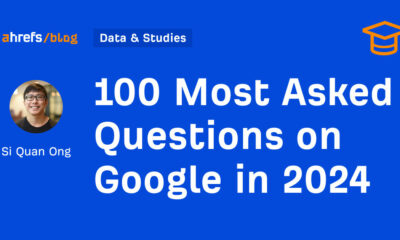SEO
21 Common Marketing Interview Questions & Answers

Marketing interviews are unpredictable, and there’s no wonder. There are many different marketing roles and candidates with many backgrounds, skills, needs, and wants. Yet some questions get asked and answered repeatedly in interview rooms everywhere.
I’ve been to many marketing interviews. To some as an interviewee, to most of them as an interviewer. There are likely hundreds of different interview questions I asked or that employers asked me. But what are the most common ones, and what should you look for in an answer?
I skimmed through many other similar articles and wrote down questions that appeared multiple times to answer this question. No matter what marketing position you’re applying for, some of the following 21 questions will be a topic of conversation during the interview:
- Why are you pursuing a career in marketing?
- What makes you interested in this role?
- What are your responsibilities in your current role?
- Why are you looking to make a change?
- What’s your most significant career achievement?
- How do you work best?
- What are your strongest skills?
- What are your weaknesses?
- What resources do you use to develop your marketing skills?
- What marketing book have you read recently?
- What marketing campaign did you recently like and why?
- What marketing tools can you use well?
- Tell me about a difficult problem that you had to solve recently. What did you do?
- Tell me about a failed campaign that you worked on. What did you learn from it?
- Tell me about a successful campaign that you worked on. What was your contribution?
- How do you measure a campaign’s success?
- Who do you think is our target market?
- How do you manage the launch of a new product?
- What new marketing tactic have you tried recently? Why did you choose it, and what did you learn?
- What are your salary expectations?
- Do you have any questions?
Let’s look into each of those questions and how to answer them.
Often seen as an icebreaker, this question can reveal quite a bit about the candidate. Every employer wants to hire people with motivation other than “it pays a pretty penny.”
There are many reasons people are interested in working in the marketing field. It’s up to you to come up with an honest answer, but some of the reasons I’ve heard are:
- Always learning new things
- Interesting, non-monotonous work
- A way to express creativity
- Many career advancement opportunities and room for growth
- The psychological aspect of better understanding human behavior
- Great community
- Suitable for remote work
- Being the “good guy” in a field that’s often frowned upon by the general public
However, there’s nothing wrong with also mentioning the money. Some marketing roles can be very lucrative.
If the candidate is not enthusiastic about the role, it’s a red flag for many hiring managers.
Let’s be honest. Many jobs aren’t that exciting. But there must be some reason you chose to apply. Maybe it looked like a suitable starting position for your career goals, or the company seemed a great place to work, or you like using the company’s products and want to be a part of spreading the word?
Being a massive fan of the company and its products was one of my biggest motivations to join Ahrefs back in 2019.
Unless you’re applying for your first job, be prepared to answer a few questions about your current and previous roles.
The only wrong way to answer this is to exaggerate or lie. It could backfire during follow-up questions or even when verifying the information by talking to your (former) colleagues.
You’ll likely get asked this if you’re looking for a new job while still working for someone else. This question is beneficial to both sides—the interviewer will learn more about your motivations, and you’ll learn whether the company seems like a good fit for you.
For example, you might not be content with your current work-life balance. If the new role requires you to often travel for business and work overtime, you might be better off looking elsewhere.
However, these reasons often revolve around stagnation and limited career or compensation growth. If this is the case for you, be honest. I often saw candidates being too shy to talk about wanting to earn more.
If you’ve already got a few years of experience on your career record, be prepared to share your proudest achievements.
However, while it’s natural to think about all the marketing campaigns you were part of, the great ideas that led to massive wins, etc., don’t limit yourself to purely performance achievements.
For example, even before joining Ahrefs as an SEO & marketing educator, I’d say that my biggest achievement was contributing to other peoples’ growth as marketers. Nothing motivates me more than people reaching out to tell me how my lecture, workshop, presentation, or article helped them.
Would you fit the team, the company’s culture, and their management style? This question isn’t explicitly related to marketing, but it’s crucial information for both parties.
Here are a few contrasts. Some people like having a list of tasks assigned to them; others prefer to create their own tasks. Some candidates perform best when they have flexible hours working from home; others like the “9 to 5” office life.
You should know what works best for you in terms of organizing your time, work-life balance, workspace, and collaboration.
You might also encounter this question masked as “what sets you apart from other candidates?”—which has a more competitive angle. This question is your chance to shamelessly pitch what you’re great at.
I recommend mentioning a mix of hard and soft skills. Hard skills are role-specific, so they could be anything from conducting great market research to writing great content that ranks in search engines. Soft skills are desirable regardless of the role, like critical thinking, communication, or leadership. They make you a better human and team player.
A 2016 survey by Smart Insights revealed the following soft skills as top requirements:

I hope this question is losing its popularity and will eventually fade away. Why?
From the interviewer’s point of view, the candidate probably won’t give a completely honest answer. No one will open up about snapping at colleagues or their tendency to procrastinate half of their working hours on YouTube. I’m exaggerating, but you get the gist.
You want to be prepared for this one. I recommend choosing a middle ground kind of answer. Don’t try to make some weakness look like a strength (I work too much). On the other hand, don’t disclose something that can jeopardize being hired.
For example, my answer here could be that I can’t stand being micromanaged and need my own space for autonomy. I can imagine that this would be a problem in larger organizations with many management levels.
How and where you learn about marketing could be used as a proxy to assess your knowledge and skills.
The thing is that many of the most popular industry blogs, YouTube channels, or influencers don’t create great marketing content. It’s often their own marketing and sales skills that made them popular, not the depth of information and value they provide.
I know this from my own experience. When I started in marketing, it was natural to follow the biggest accounts in our industry. But unfortunately, it takes a few years of consuming marketing information before you can easily separate the wheat from the chaff.
To some degree, this is also a subjective topic. If you want some inspiration, I wrote a short Twitter thread about stellar marketing resources:
I skim through tons of marketing content as a part of my job.
Want to learn from the best?
Here are 7 stellar learning resources in various formats to become a better marketer (regardless of seniority):
— Michal Pecánek (@michalpecanek) January 10, 2022
This question may initially seem like a more specific version of the previous one, but it’s the opposite because marketing books don’t need to be explicitly about marketing.
For example, among the best “marketing” books I’ve read were pieces from Daniel Kahneman and Dan Ariely, who are both key figures in behavioral psychology and economy. Dale Carnegie and Robert Cialdini are other examples of popular non-marketer authors who can teach you a lot about marketing.
But what if you don’t read marketing books? What if you don’t like reading books at all? In today’s world of online long-form content across all mediums, you can be a great marketer and a generally knowledgeable person without reading books. Just steer the conversation towards the other mediums.
You don’t even have to be a marketer to answer this question. We’re all bombarded by marketing communications every day. But as marketers, we can likely appreciate the campaigns more, analyze them, and use them as inspiration.
There’s no right or wrong campaign to choose. You can only get bonus points by expanding on why you like it. The most recent campaign that stood out to me was Coinbase’s ad during the 2022 Super Bowl:
https://www.youtube.com/watch?v=eIUD_NE1BDo
I’m sure many other marketers would pick this one too right now, but here are some reasons why I like it:
- It instantly makes viewers wonder what’s going on. There’s no branding, so the only way to find out more is to scan the QR code.
- It’s a stellar example of how creativity can beat all marketing and branding best practices.
- The creative is as low cost as possible. Other companies spend millions on creating Super Bowl ads, whereas Coinbase used that money to buy twice the standard 30s airtime.
- The outage of their website after scanning the QR code might as well have been an additional PR stunt. This only amplified their coverage in the media, which could be more valuable than making the website load for everyone.
No matter what marketing position you’re applying for, you need to know the basics of some marketing tools. And since a lot of marketing revolves around data, I would even consider spreadsheets as marketing tools.
The knowledge of specific tools often gets mentioned in the job description. For example, we require a good understanding of our SEO platform for all marketing positions.
Are you going to do something on a laptop during the interview? Probably not. But it’s pretty easy to test this knowledge even without having the candidate use the tools. I often tested candidates who supposedly had a good grasp of Google Analytics by asking about specific metrics or how they read and interpreted sample reports.
This question is one of those “how do you work under pressure?” questions. No one can assess your ability in these situations until they see you in one. But the interviewer can undoubtedly learn a thing or two about your problem-solving skills.
Many of us encounter difficult problems regularly. You have a chance to describe a challenging situation, but you managed to resolve it very well. Of course, the more impactful the decisions were, the better. Just make sure they were based on something better than a “gut feeling” that we marketers sometimes like to trust.
Things can’t always go as planned, so it’s only natural that some of our marketing campaigns fail. It can feel unpleasant at the time, but these happenings provide the best learning opportunities. You just have to leverage it—and that’s where this question is pointing.
For example, I failed at creating a Wikipedia page for Ahrefs. It’s a lot of work that involves many tasks, so we might as well call it a campaign. However, I used that experience to write one of the most in-depth and actionable articles on how to create a Wiki page. Those ~4,000 words already went through thorough revisions and editing, so I’m sure you can talk about your experience for a minute or two.
This question is obviously similar to the previous ones, but it’s focused more on planning, running, and evaluating a marketing campaign and your role in it.
If you’re thinking about many campaigns, choose one where you played a significant role. It wouldn’t sound good to dive into an impactful campaign before telling the interviewer you were more of a bystander.
According to this research by AMA, nearly 50% of marketing leaders reported a lack of people who can link marketing analytics to practice. If the position requires analyzing and interpreting data (most marketing jobs do), be prepared to be asked about marketing data, analytics, or even some basic statistics.
The best short answer here is “it depends,” but it’s evident that the interviewer wants to hear you describe a few marketing KPIs and possibly even some proxy metrics related to those KPIs.
For example, suppose you’re asked or want to talk about an SEO campaign. In that case, you could say that a universal SEO KPI is search visibility (also known as organic share of voice) and that contributing indicators are relevant organic traffic and keyword rankings.
There’s likely no better question to test whether a candidate did their homework and checked the company’s website and products. In the case of some companies, they provide the answers right on the homepage:

I’m undoubtedly biased, but it’s pretty clear that we offer products for anyone who wants to do SEO—from beginners (usually SMBs and individual business owners) through SEO pros to enterprise clients (hinted at the top navigation bar).
No one expects you to be spot on in identifying all target segments that make up their target market. But you should be able to deduce a fair bit from the company’s communication and their products.
Let’s face it; an experienced marketer could probably start an hour-long monologue in response to this question. A junior one would be pretty lost. I’m not a massive fan of this question, but it appears in many other articles about marketing interview questions, so we’d better cover it.
You will always get asked this question in a specific context. If you’re applying for a social media marketing role, you don’t need to develop a complete go-to-market strategy. Put yourself in the role and think about all the tasks you might have to do when launching a new product. In social media marketing, it could be:
- Come up with teasers as social media posts before the launch
- Prepare product launch announcement posts
- Reveal the product to selected influencers and media beforehand, get them to try it, use them for amplification
- Create visuals for all posts and ads
- Plan promotion campaigns
- Come up with a series of posts that help with onboarding and making the best of use of the product
We marketers always have new technologies, platforms, and tactics to try. In fact, many marketers these days spend most of their time on advertising and promotion. As a result, they don’t engage much in the vast array of other marketing activities:

I’m pointing towards the ideal answers here in the reverse order. You should only choose new shiny tactics, techniques, tips, hacks (or whatever you call them) if they fit into your marketing strategy. TikTok might be the hottest platform for a while, but that isn’t a reason to use it for business.
Think about something new or unorthodox that you used recently because it had the potential to get you closer to your marketing objectives. It doesn’t matter what it is as long as it makes sense from the strategic perspective.
16 Marketing Tactics That Work
For many, money talk could be one of the most uncomfortable parts of the interview—so you’d better come prepared.
First of all, do diligent research about salaries, compensation packages, and companies’ budgets for your roles in your area. Look at HR portals, government statistics and open job positions with disclosed salaries. Ask your friends and acquaintances who could know this information.
Check multiple sources of information. For example, Glassdoor states that the median compensation for marketing managers in the US is around $95k, while the U.S. Bureau of Labor Statistics estimates $141k.
For 100% remote jobs, there are now many companies that offer globally competitive salaries, so you might as well look at US data even if you’re elsewhere.
After you have a good grasp of the compensation landscape, I’d urge you to at least get an idea about the salary range before you invest too much time and energy into the hiring process. The worst-case scenario for both parties is when you find out too late that there isn’t a possible compromise between the candidate’s expectations and the budget for the role.
So, do your research, get an idea of the salary range for the position you’re applying for, and this uncomfortable question can easily lead to a win-win situation.
I always asked this at the end of my interviews. Not only is it the right thing to do to let the candidate ask about anything left unanswered, but it also signals that the candidate is interested in the position.
As the candidate, you should list what you want to cover during the interview. Feel free to bring it with you. It can contain any questions about the position, company, team, culture, or experiences of the interviewers. Also, feel free to ask if you’re unsure what’s coming up next in your hiring process, when you should ideally start if you’re hired, etc.
If the interviewer doesn’t ask this question and you’re interested in working there, initiate the conversation yourself at the end of the interview. You might even make an impression this way.
Final thoughts
You should now be prepared to answer the most common marketing interview questions. That’s only half of the victory, though. Most marketing roles require skills in specific areas like SEO, PPC, or branding. Those are the hard skills that take a lot of time to master.
Good luck with your next interview!
Do you have any questions? Ping me on Twitter.
SEO
Executive Director Of WordPress Resigns

Josepha Haden Chomphosy, Executive Director of the WordPress Project, officially announced her resignation, ending a nine-year tenure. This comes just two weeks after Matt Mullenweg launched a controversial campaign against a managed WordPress host, which responded by filing a federal lawsuit against him and Automattic.
She posted an upbeat notice on her personal blog, reaffirming her belief in the open source community as positive economic force as well as the importance of strong opinions that are “loosely held.”
She wrote:
“This week marks my last as the Executive Director of the WordPress project. My time with WordPress has transformed me, both as a leader and an advocate. There’s still more to do in our shared quest to secure a self-sustaining future of the open source project that we all love, and my belief in our global community of contributors remains unchanged.
…I still believe that open source is an idea that can transform generations. I believe in the power of a good-hearted group of people. I believe in the importance of strong opinions, loosely held. And I believe the world will always need the more equitable opportunities that well-maintained open source can provide: access to knowledge and learning, easy-to-join peer and business networks, the amplification of unheard voices, and a chance to tap into economic opportunity for those who weren’t born into it.”
Turmoil At WordPress
The resignation comes amidst the backdrop of a conflict between WordPress co-founder Matt Mullenweg and the managed WordPress web host WP Engine, which has brought unprecedented turmoil within the WordPress community, including a federal lawsuit filed by WP Engine accusing Mullenweg of attempted extortion.
Resignation News Was Leaked
The news about the resignation was leaked on October 2nd by the founder of the WordPress news site WP Tavern (now owned by Matt Mullenweg), who tweeted that he had spoken with Josepha that evening, who announced her resignation.
He posted:
“I spoke with Josepha tonight. I can confirm that she’s no longer at Automattic.
She’s working on a statement for the community. She’s in good spirits despite the turmoil.”
Screenshot Of Deleted Tweet
Josepha tweeted the following response the next day:
“Ok, this is not how I expected that news to come to y’all. I apologize that this is the first many of you heard of it. Please don’t speculate about anything.”
Rocky Period For WordPress
While her resignation was somewhat of an open secret it’s still a significant event because of recent events at WordPress, including the resignations of 8.4% of Automattic employees as a result of an offer of a generous severance package to all employees who no longer wished to work there.
Read the official announcement:
Featured Image by Shutterstock/Wirestock Creators
SEO
8% Of Automattic Employees Choose To Resign

WordPress co-founder and Automattic CEO announced today that he offered Automattic employees the chance to resign with a severance pay and a total of 8.4 percent. Mullenweg offered $30,000 or six months of salary, whichever one is higher, with a total of 159 people taking his offer.
Reactions Of Automattic Employees
Given the recent controversies created by Mullenweg, one might be tempted to view the walkout as a vote of no-confidence in Mullenweg. But that would be a mistake because some of the employees announcing their resignations either praised Mullenweg or simply announced their resignation while many others tweeted how happy they are to stay at Automattic.
One former employee tweeted that he was sad about recent developments but also praised Mullenweg and Automattic as an employer.
He shared:
“Today was my last day at Automattic. I spent the last 2 years building large scale ML and generative AI infra and products, and a lot of time on robotics at night and on weekends.
I’m going to spend the next month taking a break, getting married, and visiting family in Australia.
I have some really fun ideas of things to build that I’ve been storing up for a while. Now I get to build them. Get in touch if you’d like to build AI products together.”
Another former employee, Naoko Takano, is a 14 year employee, an organizer of WordCamp conferences in Asia, a full-time WordPress contributor and Open Source Project Manager at Automattic announced on X (formerly Twitter) that today was her last day at Automattic with no additional comment.
She tweeted:
“Today was my last day at Automattic.
I’m actively exploring new career opportunities. If you know of any positions that align with my skills and experience!”
Naoko’s role at at WordPress was working with the global WordPress community to improve contributor experiences through the Five for the Future and Mentorship programs. Five for the Future is an important WordPress program that encourages organizations to donate 5% of their resources back into WordPress. Five for the Future is one of the issues Mullenweg had against WP Engine, asserting that they didn’t donate enough back into the community.
Mullenweg himself was bittersweet to see those employees go, writing in a blog post:
“It was an emotional roller coaster of a week. The day you hire someone you aren’t expecting them to resign or be fired, you’re hoping for a long and mutually beneficial relationship. Every resignation stings a bit.
However now, I feel much lighter. I’m grateful and thankful for all the people who took the offer, and even more excited to work with those who turned down $126M to stay. As the kids say, LFG!”
Read the entire announcement on Mullenweg’s blog:
Featured Image by Shutterstock/sdx15
SEO
YouTube Extends Shorts To 3 Minutes, Adds New Features

YouTube expands Shorts to 3 minutes, adds templates, AI tools, and the option to show fewer Shorts on the homepage.
- YouTube Shorts will allow 3-minute videos.
- New features include templates, enhanced remixing, and AI-generated video backgrounds.
- YouTube is adding a Shorts trends page and comment previews.
-

 WORDPRESS3 days ago
WORDPRESS3 days agoWordPress biz Automattic details WP Engine deal demands • The Register
-
SEARCHENGINES5 days ago
Daily Search Forum Recap: September 30, 2024
-

 SEARCHENGINES6 days ago
SEARCHENGINES6 days agoGoogle Volatility With Gains & Losses, Updated Web Spam Policies, Cache Gone & More Search News
-

 SEO7 days ago
SEO7 days ago6 Things You Can Do to Compete With Big Sites
-
SEARCHENGINES4 days ago
Daily Search Forum Recap: October 1, 2024
-

 SEO6 days ago
SEO6 days agoAn In-Depth Guide For Businesses
-

 AFFILIATE MARKETING6 days ago
AFFILIATE MARKETING6 days agoThis Minimalist Lamp Lets You Pick From 16 Million+ Lighting Colors for Maximum Productivity
-

 AFFILIATE MARKETING6 days ago
AFFILIATE MARKETING6 days agoNvidia CEO Jensen Huang Praises Nuclear Energy to Power AI










![Holistic Marketing Strategies That Drive Revenue [SaaS Case Study] Holistic Marketing Strategies That Drive Revenue [SaaS Case Study]](https://articles.entireweb.com/wp-content/uploads/2024/09/Holistic-Marketing-Strategies-That-Drive-Revenue-SaaS-Case-Study-400x240.png)
![Holistic Marketing Strategies That Drive Revenue [SaaS Case Study] Holistic Marketing Strategies That Drive Revenue [SaaS Case Study]](https://articles.entireweb.com/wp-content/uploads/2024/09/Holistic-Marketing-Strategies-That-Drive-Revenue-SaaS-Case-Study-80x80.png)


You must be logged in to post a comment Login